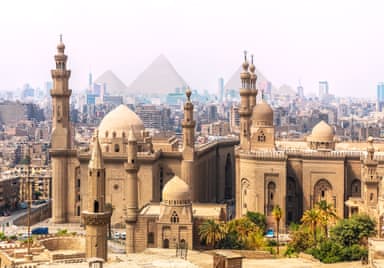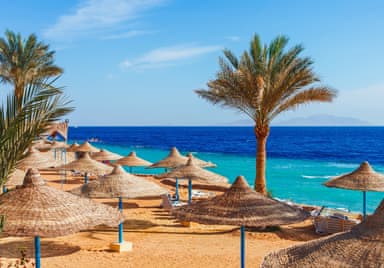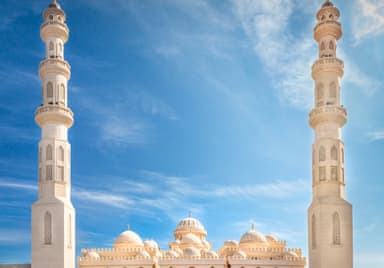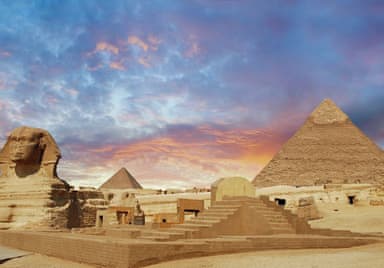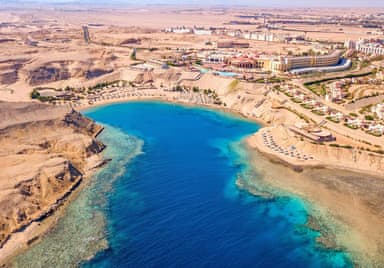
EGYPTAll Inclusive Holidays & City Escapes



 2 adults
2 adults



Egypt All Inclusive Holidays & City Escapes general information
Halal-friendly Holidays in Egypt
From the coral-filled Red Sea to the timeless beauty of the Nile, Egypt combines sunshine, history, and hospitality shaped by Muslim values. Whether you’re looking for a peaceful beach break or a cultural escape, there’s a wide choice of resorts where privacy and comfort come first. Enjoy modest-swimwear-friendly pools, women-only wellness areas, and spacious family rooms — ideal for relaxing together under the Egyptian sun.
What Are the All-Inclusive Holiday Options in Egypt?
Few destinations match the appeal of Egypt’s all-inclusive holidays, offering year-round sunshine, family-friendly resorts, and dining made easy. In Sharm El Sheikh, Rixos Premium Seagate stands out for its premium service and oceanfront setting. Guests enjoy the private beach, extensive dining choices, ladies-only indoor pool and spa facilities, ideal for those who value both comfort and privacy. For families, the resort’s kids’ club and water park keep little ones entertained from morning to evening. Over on the Red Sea coast, Pickalbatros White Beach Resort – Hurghada offers a classic beachfront experience. With elegant rooms overlooking the sea, lively entertainment programmes, and multiple pools designed for all ages, it’s a perfect balance of fun and relaxation. Guests can stroll along the palm-lined promenade, enjoy freshly prepared dishes throughout the day, and unwind knowing everything is taken care of. Explore even more choices through our collection of halal all-inclusive holidays — ideal for those seeking a care-free, luxurious escape.
What Are the Cheap Halal-friendly Hotels in Egypt?
Egypt is renowned for offering comfort at great value, making cheap holidays to Egypt a smart option for families who prefer practical stays without compromising on Muslim-friendly standards. In Sharm El Sheikh, Xperience St. George Home Stay delivers easygoing comfort close to Naama Bay. Guests can enjoy relaxing days by modest-swimwear-friendly pools, rejuvenating sessions in ladies-only spa areas, and short transfers to the vibrant Red Sea waterfront — all wrapped in a relaxed, welcoming atmosphere. Meanwhile, ELShams Hotel in Cairo provides a peaceful base for exploring Egypt’s bustling capital. An alcohol-free property, it features comfortable rooms and a friendly environment within walking distance of shops, museums, and traditional cafés. After a day of sightseeing, guests can retreat to quiet interiors that feel miles away from the city buzz. These hotels prove that affordable doesn’t have to mean basic — instead, they combine simplicity with thoughtful touches designed for families and Muslim travellers alike.
What Are the Halal-friendly Hotels in Hurghada?
Stretching along the Red Sea, Hurghada has become one of the country’s most inviting resort hubs. It’s the perfect destination for travellers who want to pair sunny relaxation with vibrant marine life and desert views. Pickalbatros Jungle Aqua Park – Neverland Hurghada stands out as a family favourite, home to one of Egypt’s largest aqua parks. Its playful design, comfortable rooms, and modest-swimwear-friendly pool areas make it a hit with both children and adults. When it’s time to unwind, the private-hire wellness centre offers moments of seclusion and calm.
For those seeking something more refined, JAZ Aquamarine combines relaxed luxury with private-hire wellness treatments and a variety of pools scattered throughout the resort. Families can alternate between swimming, beach walks, and dining on delicious local cuisine without ever leaving the property. To explore the region further, read our guide to the Red Sea – Egypt’s hidden treasure for inspiration on coral reefs, islands, and family-friendly excursions.
What Are the Halal-friendly Hotels in Sharm El Sheikh?
Sharm El Sheikh holidays are among the most popular choices for Muslim travellers, where desert landscapes meet coral-filled bays. Perfect for families who want an active yet relaxing break, Coral Sea Water World Resort is a top pick, featuring water-park-style slides, mixed-gender leisure zones with modest swimwear welcome, and a private-hire spa for those who prefer privacy during treatments. Days flow easily here — snorkelling, swimming, and sharing meals with family against a Red Sea backdrop. Close by, Pickalbatros Aqua Blu Sharm El Sheikh is another trusted name known for comfort and consistency. Guests can enjoy a fully-secluded wellness area, family entertainment, and direct access to the popular Aqua Park. The resort’s warm atmosphere and thoughtful facilities make it ideal for guests of all ages. For more ideas on combining cultural sites with coastal relaxation, discover our top 10 places to visit in Egypt — from seaside towns to ancient landmarks.
What Are the Halal-friendly Hotels in Cairo?
No trip to Egypt would be complete without time in Cairo, where history and modern life come together. For those who like resort-style comfort within reach of the city’s famous attractions, JW Marriott Hotel Cairo offers lush gardens, spacious pools, and private-hire spa treatments, all within minutes of New Cairo’s shops and restaurants. Families can unwind in elegant surroundings while still being close to landmarks such as the Citadel and the Egyptian Museum. For a more intimate stay, Turquoise Pyramids View Hotel in Giza combines cosy interiors with breathtaking pyramid views. As an alcohol-free property, it offers tranquillity and a welcoming atmosphere for families visiting one of the world’s most iconic sites. Both hotels make excellent bases for exploring Egypt’s heritage, from the Nile’s banks to Luxor and Aswan further south. To plan your journey beyond the capital, explore halal-friendly holidays in Southern Upper Egypt, featuring peaceful riverside resorts and cultural highlights steeped in history.
By registering I accept Halalbooking’s Terms of Use and Privacy & Cookie Policies.


